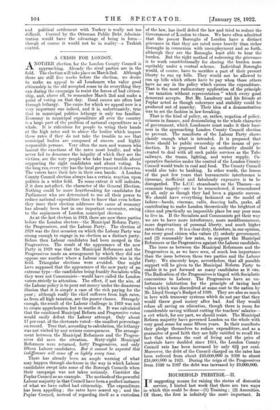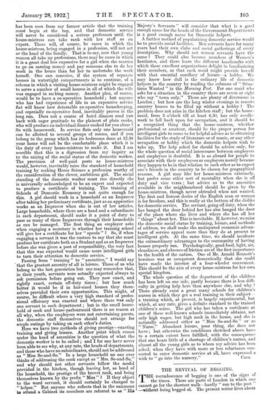HOUSEHOLD PRESTIGE.—II.
TN suggesting means for raising the status of domestic 1- service, I hinted last week that there are two ways in which this could be done—(1) Training ; (2) Amenities. Of these, the first is infinitely the more important. It has been seen from my former article that the training must begin at the top, and that domestic service will never be considered a serious profession until the house-mistress can take rank with her staff as an expert. There will, of course, be cases in which the house-mistress, being engaged in a profession, will not act as the head of the family. That is to say, now that young women all take up professions, there may be cases in which it is a great deal less expensive for a girl when she marries to go on earning money and pay someone else to do her work in the house than for her to undertake the work herself. One can conceive, if the system of separate houses in watertight compartments is to continue, of a scheme in which a visiting house-mistress might be engaged to serve a number of small houses in all of which the wife was engaged- in me king money. Another plan, of course, would be to have a co-operative household ; but anyone who has had experience of life in an expensive service flat will know how detestable co-operative housekeeping, and especially co-operative food, inevitably proves in the long run. Does not a course of hotel dinners, send you back with eager gratitude to the plainest of plain cooks, who will produce an individual dinner cooked for you alone ? So with housework. In service flats only one housemaid can be allotted to several groups of rooms, and if you belong to the group which has its bedrooms done at 12.30 your home will not be the comfortable place which it is the duty of every house-mistress to make it. But I am sensible that this is a digression from my inquiry as to the raising of the social status of the domestic worker. The provision of well-paid posts as house-mistress would, however, inevitably raise the standard of household training by making Home Science a profession worthy of the consideration of the clever, ambitious girl. The social standing of the domestic worker must rise directly she is universally acknowledged to be an expert and expected to produce a certificate of training. The training of Schools of Domestic Economy is not quite enough for this. A girl should work in a household as an Improver after taking her preliminary certificate, just as an apprentice works as an Improver when she is out of her articles. Large households, where there are a head and a subordinate in each department, should make it a point of duty to pass as many of these Improvers through their households as can be managed. The first thing an employer asks when engaging a secretary is whether her training school will give her a certificate for her " speeds " ? So, if when engaging a servant it was the custom to say that she must produce her certificate both as a Student and as an Improver before she was given a post of responsibility, the very fact that this was expected would cause more intelligent girls to turn their attention to domestic service.
Passing from " training " to " amenities," I would say that the greatest amenity of all is leisure. Those of us who belong to the last generation but one may remember that, in their youth, servants were actually expected always to ask permission before going out. They now exact, and rightly exact, certain off-duty times ; but how much better it would be if in fair-sized houses they them- selves provided their own opportunities. This might, of course, be difficult where a very high standard of profes- sional efficiency was exacted and where there was only one servant in each department ; but in the small house- hold of cook and house-parlourmaid there is no reason at all why, when the employers were not entertaining guests, the domestic staff themselves should not arrange for ample outings by taking on each other's duties. Here we have two methods of giving prestige—exacting training and giving leisure. Another point which comes under the head of amenities is the question of what the domestic worker is to be called ; and I for one have never been able to see why, at any rate, the heads of departments, and those who have no subordinates, should not be addressed as " Miss So-and-So." In a large household no one ever thinks of addressing the cook except as " Mrs. So-and-So," and why should not other servants follow the model provided in the kitchen, though leaving her, as head of the household, the prestige of the brevet rank, and being themselves known by the prefix " Miss " If they object to the word servant, it should certainly be changed to " helper." But anyone who reflects that in the summons to attend a Cabinet its members are referred to as " His Majesty's Servants " will consider that what is a good enough name for the heads of the Government Departments is a good enough name for Domestic helpers. A further method of popularizing domestic service would be to provide social facilities. Men servants have for many years. had their own clubs and social gatherings of every description. Why should not women servants have the same ? They could also become members of Women's Institutes, and there learn the different handicrafts with which these excellent organizations delight in familiarizing their members, so that each maid might provide herself with that essential corollary of leisure—a hobby. We may know how dull is the ordinary life of domestic helpers in the country by reading the columns of " Situa- tions Wanted " in the Morning Post. For one maid who asks for a situation in the country there are seven or eight who say " town only." There are plenty of diversions in London ; but how are the long winter evenings in remote country houses to be filled up without a hobby ? The problem does not arise in the kitchen staff ; but the house- maid, from 3 o'clock till at least 6.30, has only needle- work to fall back upon for occupation, and it should be a recognized thing that the house-mistress, whether professional or amateur, should be the proper person for intelligent girls to come to for helpful advice as to obtaining facilities for the study of literature or of music, or any other occupation or hobby which the domestic helpers wish to take up. The help asked for should be advice only, for the whole question of social intercourse between employers and employees is doubtful. It is as absurd for people to associate with their employees or employers merely because they happen to be in that relation to each other as to expect one's friends in the country to be chosen for geographical reasons. A girl may like her house-mistress extremely, but prefer some other sort of mentality when she is off duty and vice versa ; but advice as to the amenities available in the neighbourhood should be given by the house-mistress, though never obtruded when not wanted. The first and fiercest desire of the English man or woman is for freedom, and this is really at the bottom of the dislike for domestic service. The servant, going off duty, when she has banged the door behind her has also banged the door of the place where she lives and where she has all her "things " about her. This is inevitable. If, however, we raise the domestic social status by training, leisure, and methods of address, we shall make the undisputed economic advan- tages of service appeal more than they do at present to intelligent girls. At the same time, we should inculcate the extraordinary advantages to the community of having houses properly run. Psychologically, good food, light, air, cleanliness, and absence of friction are of the first importance to the health of the nation. One of Mr. Arnold Bennett's heroines was so competent domestically that she could. have made the interior of a four-wheeler convenient. This should be the aim of every house-mistress for her own special kingdom. The whole question of the department of the children has been left on one side, partly because there is less diffi- culty in getting help here than anywhere else, and why ? There already exist a great many schools for children's nurses in which they get a real training in their subject— a training which, at present, is largely experimental, but which, at any rate, gives a definite standard to the trained children's nurse. The girl who has taken a certificate at one of these well-known schools immediately obtains, not only high wages, but high rank in the house, and she is naturally addressed either as " Miss So-and-So " or as " Nurse." Abundant leisure, poor thing, she does not have ; but otherwise the conditions sketched above have to a certain extent been fulfilled, with the consequence that one hears little of a shortage of children's nurses, and almost all the young girls as to whom my advice has been asked, when they have with more or less reluctance con- sented to enter domestic service at all, have expressed a wish to " go into the nursery." CAIA.



































 Previous page
Previous page